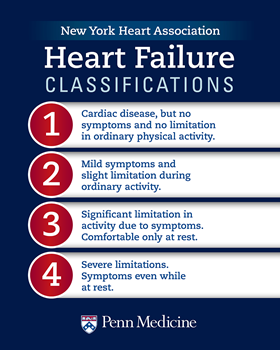
Can Heart Failure be Cured? Heart Failure Classification, Causes, Symptoms, Treatment
Heart diseases such as hypertensive heart disease (Hypertensive Heart Disease) and coronary heart disease (also known as ischemic heart disease) often cause cardiac hypertrophy and increase the risk of heart failure.
Many people may see “failure” and think that their heart is failing and about to fail. In fact, there are four grades of heart failure. Early treatment can not only significantly reduce mortality, but patients can even still maintain sufficient heart function to engage in their favorite activities. Activity.
This article will introduce the causes, symptoms, treatment and life precautions of heart failure patients, and work with you to prevent the worsening of heart failure.
What is heart failure?
Heart failure is also called congestive heart failure, which simply means heart weakness. Under normal circumstances, each beat of the heart sends enough blood to all parts of the body to keep the organs functioning. However, if there is a barrier for blood to enter the ventricles, or the heart does not pump enough blood, it may lead to heart failure.
According to the different ventricles and differences in contraction and relaxation, heart failure can be divided into the following four categories:
- Left-sided heart failure:
may cause blood to accumulate in the pulmonary veins, causing shortness of breath or difficulty breathing. - Right-sided heart failure:
Blood may accumulate in the lower limbs and abdomen, causing edema. - Systolic heart failure:
The heart cannot contract properly, causing problems with its pumping function. - Diastolic heart failure:
The heart cannot relax completely, preventing blood from being fully pumped into the ventricles.
Heart failure grade
In order to facilitate the differentiation of heart failure, the New York Heart Association and the American Heart Association each use different classification methods and list 4 grades according to the course of heart failure, both of which can assist doctors in determining The patient’s degree of heart failure (NYHA).

Symptoms of heart failure
Heart failure may cause many symptoms, mainly edema and breathing problems. However, the following symptoms can also be caused by other heart diseases. Therefore, it is recommended to seek medical treatment as soon as possible and have it diagnosed by a professional physician.
- Shortness of breath or difficulty breathing, especially when lying down.
- Swelling of veins in the feet, ankles, legs, abdomen, and neck.
- Decreased ability to exercise, such as becoming more breathless or tired when climbing stairs or walking.
- If you keep coughing, the sputum may appear red or pink with blood streaks.
- Edema causes weight gain, which may increase by 2.5 kilograms within a few days.
- Fast or irregular heartbeat.
- Loss of appetite or nausea.
- Frequent urination at night.
- Palpitations.
- Angina pectoris.
- Tired.
How to diagnose heart failure
When making a diagnosis, doctors will also pay attention to whether there are other heart problems. For example, using a stethoscope can not only tell whether there is congestion in the lungs, but also hear whether there is a murmur in the heart, which may also be one of the signs of valvular heart disease. , here are other ways to diagnose heart failure:
- Blood test
- Chest X-ray
- Electrocardiography, ECG or EKG
- Echocardiography
- exercise stress test
- Coronary angiography
- Cardiac Computed Tomography (CT)
- Cardiac MRI

Risk of heart failure
If any of the following conditions is met, the risk of heart failure will increase. The more items that are met, the greater the chance of suffering from the disease.
- hypertension
- coronary artery stenosis
- Elders
- Obese people
- Have had a myocardial infarction
- Congenital Heart Defects
- Sleep apnea
- some drugs
Complications of heart failure
- Kidney failure
- Valvular heart disease
- Arrhythmias
- liver damage
Can heart failure be completely cured? Are there any ways to improve it?
Heart failure usually progresses slowly. Most patients with stage 1 heart failure will not even feel anything abnormal in their heart or body. However, if they do not actively receive treatment or improve their lifestyle, heart failure will often continue to worsen. Symptoms such as shortness of breath, easy fatigue, or heart palpitations gradually appear.
Although heart failure cannot be completely cured, if heart failure can be strictly controlled in the early stages and the decline of heart function can be minimized, heart failure patients can still engage in their favorite jobs or interests. Therefore, it is recommended that the public actively cooperate with doctors for diagnosis and treatment once heart failure is diagnosed. Only by following medical advice can you effectively avoid worsening of heart failure.
Treatments for heart failure
Heart failure is a disease that requires long-term care. Medication can strengthen the heart and slow down the occurrence of symptoms and complications. Physicians may also prescribe statins to lower cholesterol, or nitrates to improve angina. The following are drugs to treat heart failure:
- Angiotensin Converting Enzyme Inhibitors (ACEI)
- Angiotensin Receptor Blocker (ARB)
- Beta-blocker (β-Blocker)
- Diuretic
- Aldosterone antagonist
- Myocardial contractility enhancer (Inotrope)
- Digoxin

Heart failure surgery
Heart problems are often caused by other heart problems, such as coronary artery blockage or heart valve problems. In this case, doctors may recommend corresponding surgery to treat the heart problem and improve heart failure.
- Coronary Artery Bypass Graf (CABG)
- Heart valve repair or replacement
- Implantable Cardioverter Defibrillator (ICD)
- Ventricular assist device (VAD)
- Heart transplant
Palliative care and end-of-life care
Palliative care is a medical approach that focuses on alleviating symptoms and improving the patient’s quality of life. Its purpose is not to cure the patient, but to relieve the patient’s pain caused by the disease or medical treatment.
Palliative care is often considered to be a passive treatment method adopted when patients are terminally ill and there is no way to cure them. However, palliative care can actually be used on patients with various disease courses and can also be used as a part of active treatment.
When some patients reach the end stage of heart failure and may no longer be able to improve with drugs, surgery, or transplantation, doctors may adopt end-of-life care, or palliative care, which uses palliative care to alleviate the patient’s symptoms at the end of life. pain of.
Drink an appropriate amount of water and eat less salt. Daily life tips for patients with heart failure.
In addition to receiving drug or surgical treatment, heart failure patients should also follow the following recommendations to adjust their lifestyle:
- Don’t drink too much water:
Please discuss with your doctor the water drinking policy that is suitable for you. It is generally recommended that the daily water intake for heart failure is between 1000~1500ml to avoid excessive water intake and increase the burden on the heart. - Limit salt intake:
It is recommended that patients with heart failure should have a daily sodium intake of less than 2,000 mg (approximately 5 grams of table salt); for those with severe edema symptoms, the daily sodium intake should not exceed 1,200 mg (3 grams of table salt). In addition, patients should also avoid ingesting high-salt and pickled products, such as pickles, braised vegetables, soy sauce, sausages, etc. - Record weight changes:
Daily weight measurement is very important for heart failure patients to control diet and water intake. It is recommended to measure weight every morning after getting up and going to the toilet to facilitate comparison of weight changes. If you gain 2 to 3 kilograms in weight within a week and your ankles are edematous, you should seek medical attention immediately. - Avoid being in environments with drastic changes in hot and cold temperatures:
Reduce saunas and bathing before and after hot springs, which may cause additional burden on the heart due to drastic temperature changes.
How to prevent heart failure
The methods to prevent heart failure are actually not far from the prevention of most heart diseases. A healthy lifestyle can slow down the aging rate of the body and reduce the chance of cardiovascular system problems. The following are 8 methods to prevent heart failure:
- quit smoking
- healthy diet
- Stay away from bad fats
- vaccination
- Quit drinking
- improve sleeping
- moderate exercise
- Control weight













